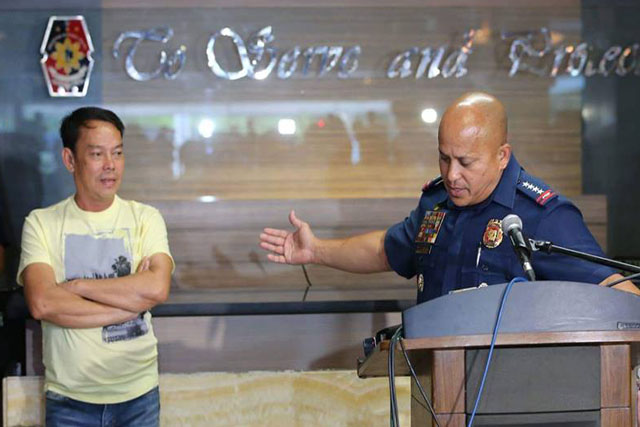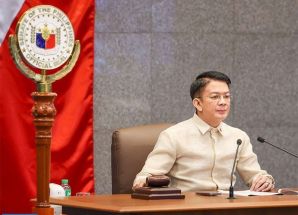Finally, Congress passes budget
January 30, 2007 | 12:00am
Congress finally ratified yesterday the long delayed P1.126-trillion national budget for 2007, which now only needs President Arroyo’s signature to allow more funds to be made available for services in education, health and infrastructure.
Voting separately, the Senate and the House of Representatives unanimously ratified the reconciled version of the bill crafted by the bicameral conference committee.
Senate finance committee chairman Franklin Drilon described the approved measure as "a national budget that does not focus solely on the imperatives of economic growth but also pursues growth with equity."
"We are certain that this budget will not only facilitate government operations this year but more importantly, we are proud that we have labored with this important piece of legislative work that will hopefully make a difference in the lives of 85 million Filipinos," Drilon said.
House Majority Leader Prospero Nograles said the approval of the budget "will spur economic development."
Malacañang welcomed the ratification of its proposed budget for infrastructure and social spending, saying the outlay is integral to an improved economy and poverty alleviation.
Press Secretary Ignacio Bunye said "people can now expect the promised social payback after bearing with the tough economic reforms instituted by the government."
"President Arroyo welcomes the passage of the budget. This legislative measure is essential for social payback. We can now implement more social services in the areas of education, health as well as infrastructure," Bunye said.
Since January, the government has been working on a reenacted 2005 budget because of the failure of Congress to pass the 2007 appropriation last year.
Disagreements over the P4.7-billion school-feeding program snagged the budget deliberation in the bicameral level. But a compromise was reached during the month-long Christmas break.
Under the agreement, P2.613 billion would be set aside for the Department of Education’s (DepEd’s) school building program.
Drilon said the funds would be used to finance the construction of some 5,400 more classrooms on top of what had already been programmed under the 2007 budget.
Another P2 billion would be allocated to the school-feeding program but instead of rice, the DepEd would be distributing vegetable-based noodles, milk and coco pandesal to address the malnutrition problem among public school children.
The approved budget would also include a P10-billion calamity fund to assist in the reconstruction and rehabilitation efforts in areas devastated by a series of typhoons last year, particularly in Bicol.
Sen. Joker Arroyo pointed out that the budget would also grant Malacañang the authority to use part of the P10.3 billion in unprogrammed funds for the salary increase of government employees.
He said the increase would be equivalent to around 10 percent of the monthly salaries of all government employees, including those in the uniformed services and in government corporations.
"The point is that there’s P10.3 billion already allotted by Malacañang. The only problem is the manner and procedure of how to implement it. I think this should be effective July but the money is there already," Senator Arroyo said.
The budget also includes additional appropriations for the capital outlay of regional hospitals and subsidy for indigent patients in specialty hospitals.
"We have also required the mandatory health coverage of all indigents under Philhealth under this budget, the funding requirement of which shall be charged against the internal revenue allotment of local government units," Drilon said.
For the last three years, the government bureaucracy has been operating on re-enacted budgets that are only supplemented to accommodate the increases in expenses and other exigencies.
Earlier in the day, Mrs. Arroyo told reporters that she would be happy if Congress would be able to pass the budget and the proposed Anti-Terrorism Bill before it adjourns next week.
Mrs. Arroyo said she is confident that Senate President Manuel Villar will make good his promise to focus on the passage of priority legislative measures pending in Congress.
"What we really want is to see the passage of the national budget and the anti-terrorism bill. We have less than two weeks to go but Senator Villar has made his promise to do everything to pass these two bills," she said after presiding over a televised roundtable discussion on her recent trip to Davos, Switzerland.
For his part, Presidential Adviser for Political Affairs Gabriel Claudio commended the Senate for the "prompt ratification" of the bicameral report of the General Appropriations Act.
"Congress’ responsiveness complements and puts on high gear our country’s momentum for an economic boom and turnaround," Claudio said.
He said Mrs. Arroyo is expected to sign the measure as soon as possible. – With Jess Diaz
Voting separately, the Senate and the House of Representatives unanimously ratified the reconciled version of the bill crafted by the bicameral conference committee.
Senate finance committee chairman Franklin Drilon described the approved measure as "a national budget that does not focus solely on the imperatives of economic growth but also pursues growth with equity."
"We are certain that this budget will not only facilitate government operations this year but more importantly, we are proud that we have labored with this important piece of legislative work that will hopefully make a difference in the lives of 85 million Filipinos," Drilon said.
House Majority Leader Prospero Nograles said the approval of the budget "will spur economic development."
Malacañang welcomed the ratification of its proposed budget for infrastructure and social spending, saying the outlay is integral to an improved economy and poverty alleviation.
Press Secretary Ignacio Bunye said "people can now expect the promised social payback after bearing with the tough economic reforms instituted by the government."
"President Arroyo welcomes the passage of the budget. This legislative measure is essential for social payback. We can now implement more social services in the areas of education, health as well as infrastructure," Bunye said.
Since January, the government has been working on a reenacted 2005 budget because of the failure of Congress to pass the 2007 appropriation last year.
Disagreements over the P4.7-billion school-feeding program snagged the budget deliberation in the bicameral level. But a compromise was reached during the month-long Christmas break.
Under the agreement, P2.613 billion would be set aside for the Department of Education’s (DepEd’s) school building program.
Drilon said the funds would be used to finance the construction of some 5,400 more classrooms on top of what had already been programmed under the 2007 budget.
Another P2 billion would be allocated to the school-feeding program but instead of rice, the DepEd would be distributing vegetable-based noodles, milk and coco pandesal to address the malnutrition problem among public school children.
The approved budget would also include a P10-billion calamity fund to assist in the reconstruction and rehabilitation efforts in areas devastated by a series of typhoons last year, particularly in Bicol.
Sen. Joker Arroyo pointed out that the budget would also grant Malacañang the authority to use part of the P10.3 billion in unprogrammed funds for the salary increase of government employees.
He said the increase would be equivalent to around 10 percent of the monthly salaries of all government employees, including those in the uniformed services and in government corporations.
"The point is that there’s P10.3 billion already allotted by Malacañang. The only problem is the manner and procedure of how to implement it. I think this should be effective July but the money is there already," Senator Arroyo said.
The budget also includes additional appropriations for the capital outlay of regional hospitals and subsidy for indigent patients in specialty hospitals.
"We have also required the mandatory health coverage of all indigents under Philhealth under this budget, the funding requirement of which shall be charged against the internal revenue allotment of local government units," Drilon said.
For the last three years, the government bureaucracy has been operating on re-enacted budgets that are only supplemented to accommodate the increases in expenses and other exigencies.
Earlier in the day, Mrs. Arroyo told reporters that she would be happy if Congress would be able to pass the budget and the proposed Anti-Terrorism Bill before it adjourns next week.
Mrs. Arroyo said she is confident that Senate President Manuel Villar will make good his promise to focus on the passage of priority legislative measures pending in Congress.
"What we really want is to see the passage of the national budget and the anti-terrorism bill. We have less than two weeks to go but Senator Villar has made his promise to do everything to pass these two bills," she said after presiding over a televised roundtable discussion on her recent trip to Davos, Switzerland.
For his part, Presidential Adviser for Political Affairs Gabriel Claudio commended the Senate for the "prompt ratification" of the bicameral report of the General Appropriations Act.
"Congress’ responsiveness complements and puts on high gear our country’s momentum for an economic boom and turnaround," Claudio said.
He said Mrs. Arroyo is expected to sign the measure as soon as possible. – With Jess Diaz
BrandSpace Articles
<
>
- Latest
- Trending
Trending
Latest
Trending
Latest
Recommended






























